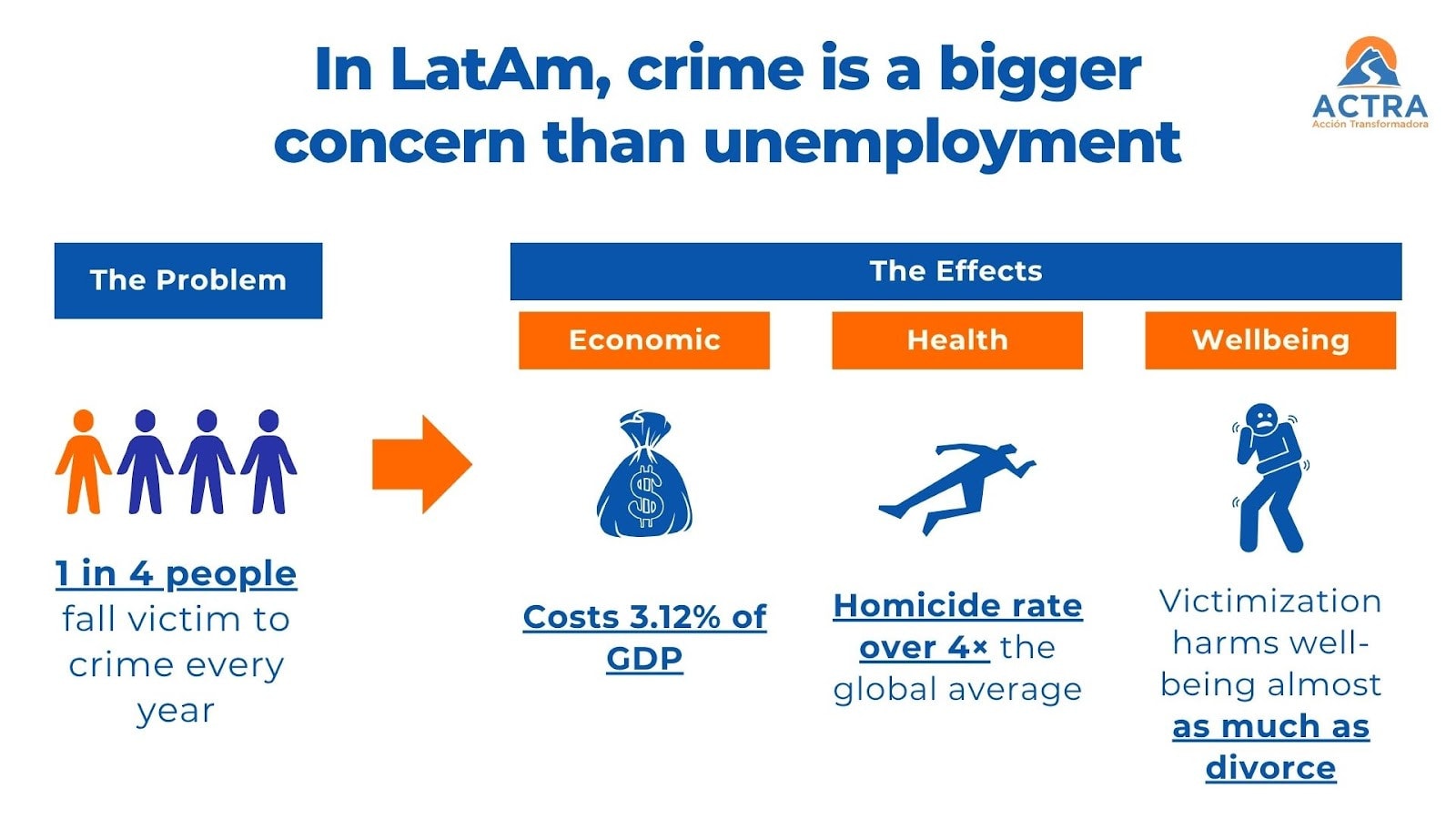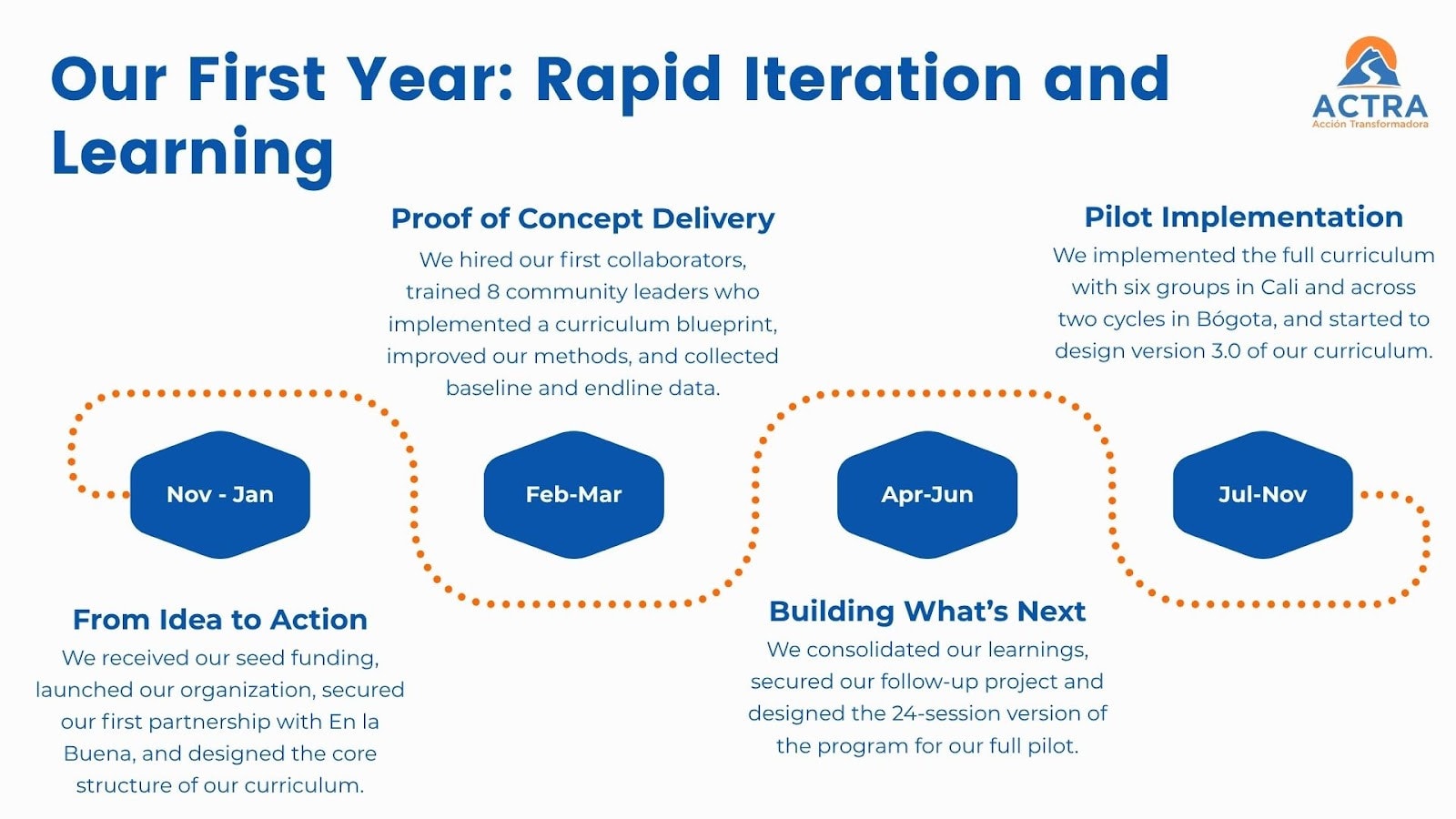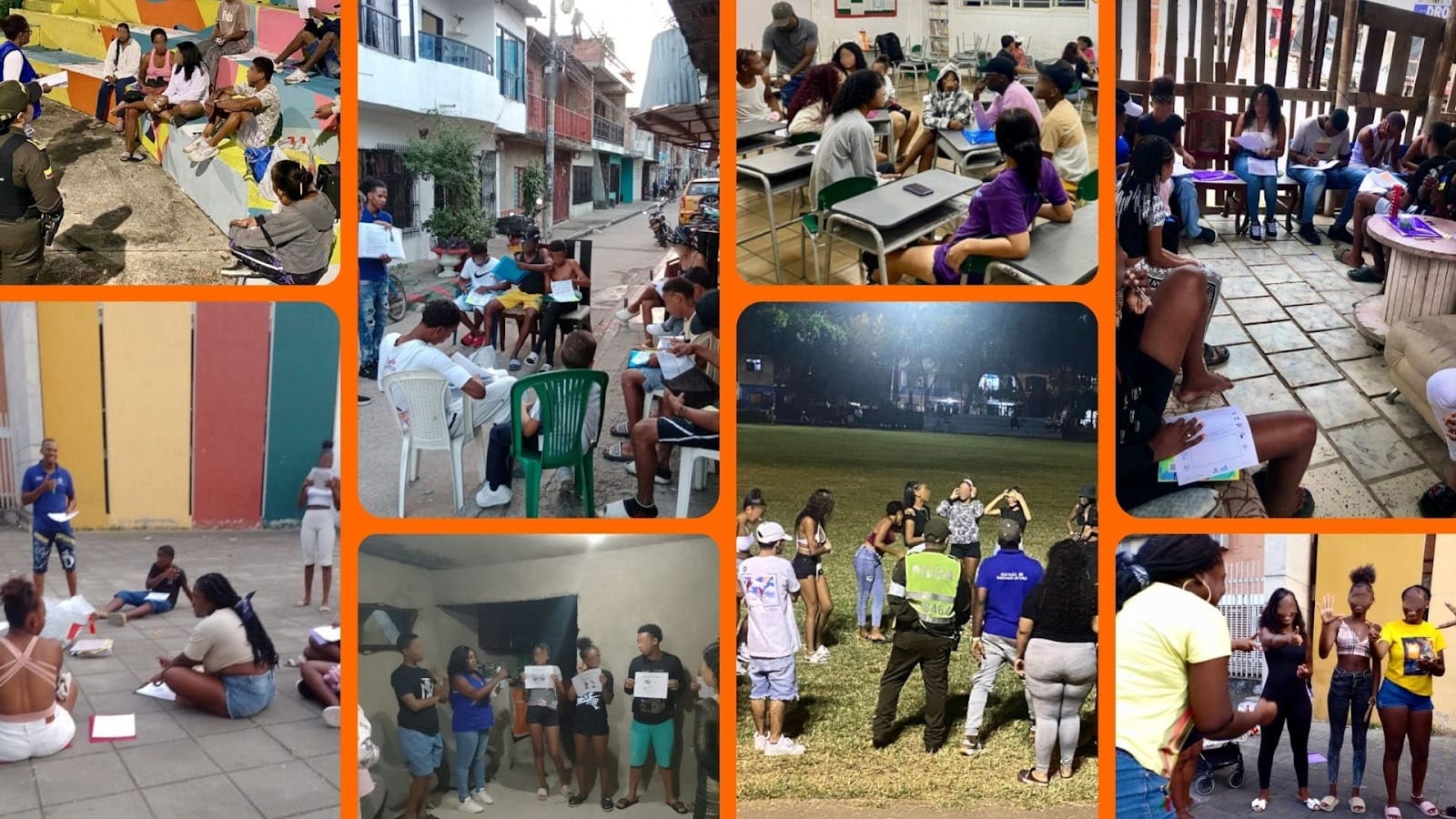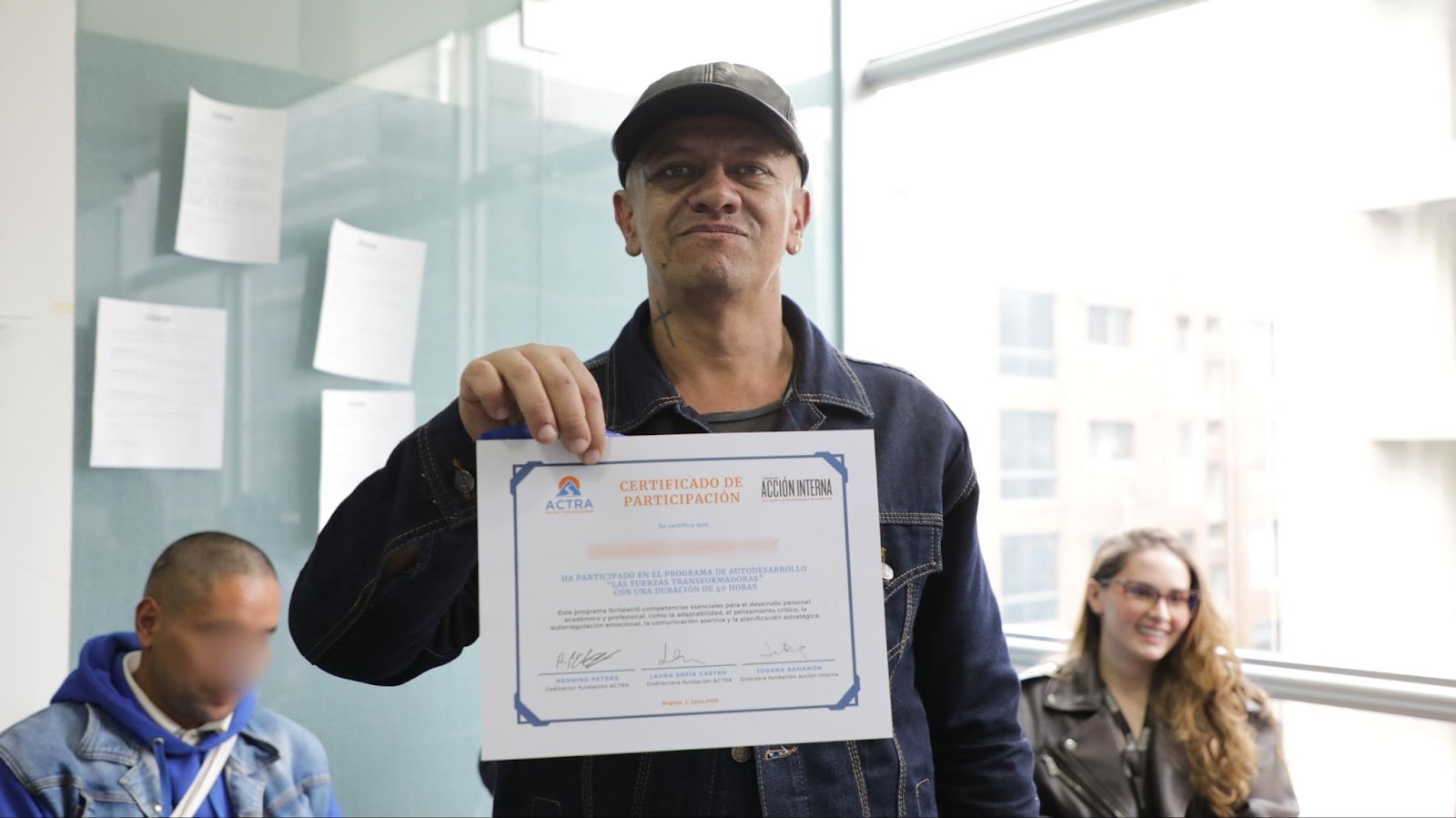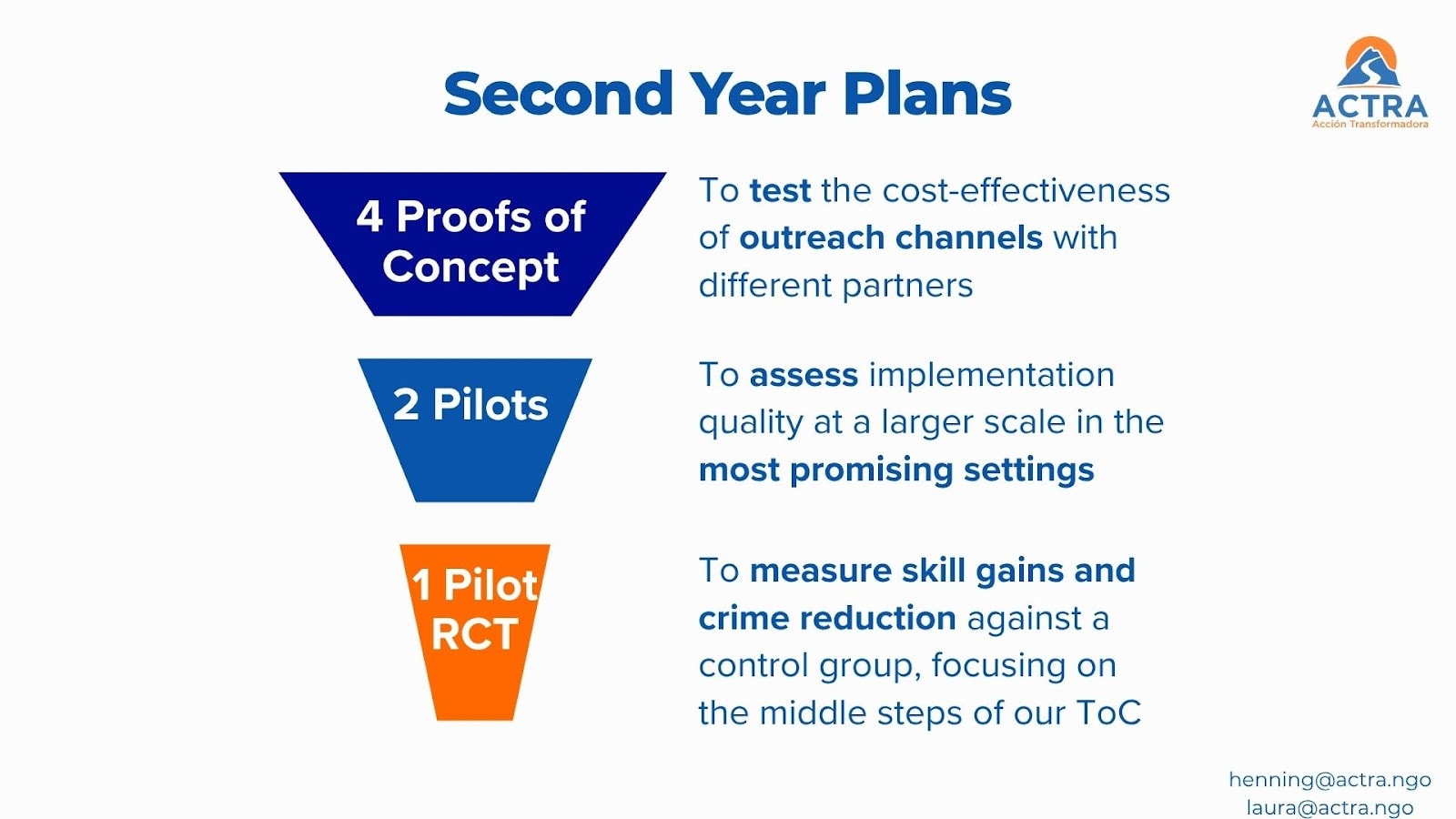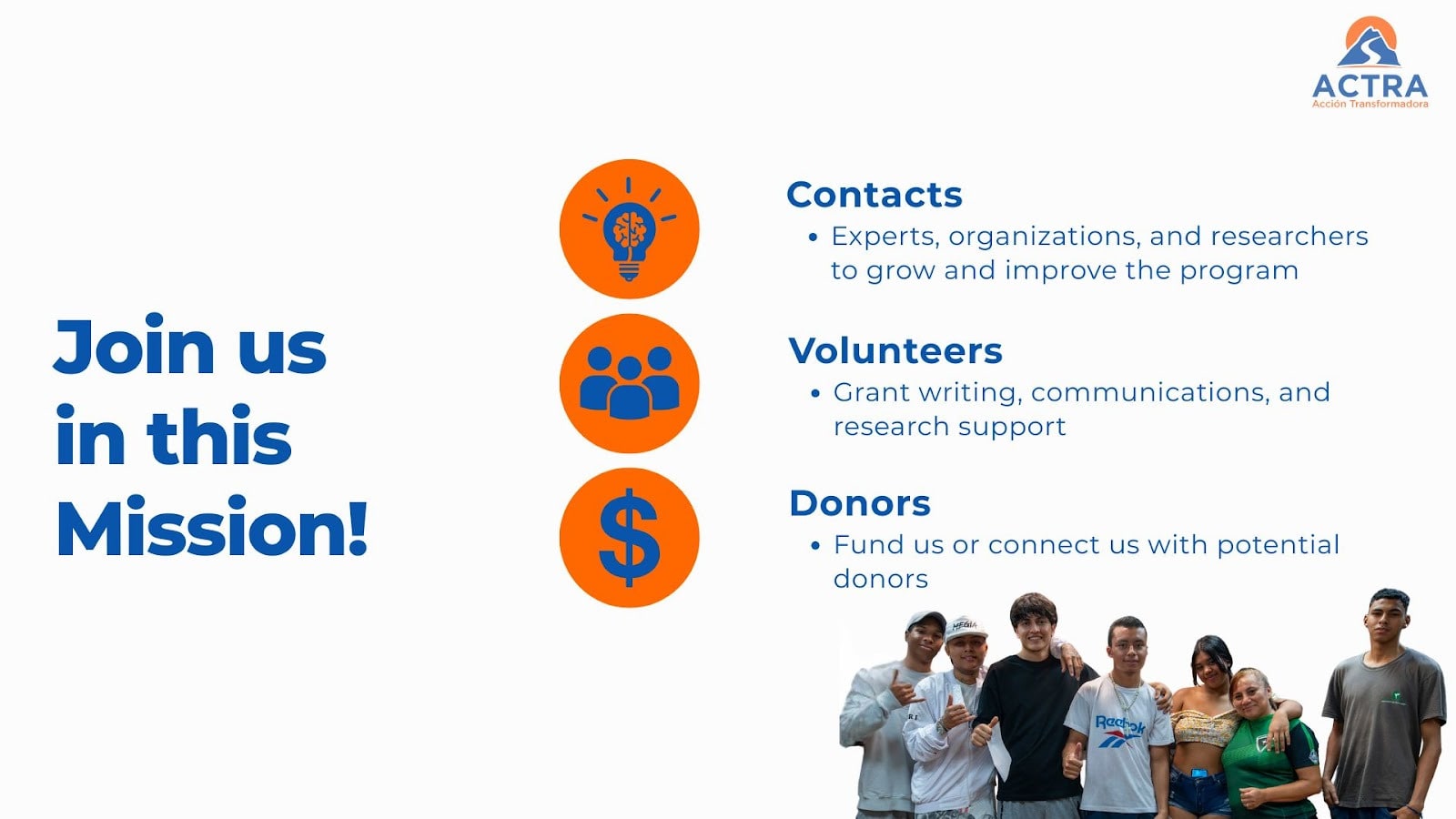ACTRA: A Promising Crime-Prevention Intervention at a Crucial Funding Moment
By Henning Peters, Laura Sofia, Adina Ionescu @ 2025-11-17T18:20 (+35)

ACTRA (Acción Transformadora), incubated through the AIM Charity Entrepreneurship Incubation Program, has just completed a strong first year — showing both traction and potential for impact. Said potential has led to the Happier Lives Institute awarding ACTRA an Honorable Mention for promising cost-effectiveness at scale.
In this post, we will briefly outline our first year’s traction, future plans, and the current opportunity to fund ACTRA. For a more thorough introduction into Cognitive Behavioral Therapy-informed approaches to prevent crime, ACTRA’s Theory of Change and the evidence supporting it, you may also consult our recently updated brochure.
Executive Summary
ACTRA’s goal is to adapt and scale a cost-effective, evidence-based crime prevention program based on Cognitive Behavioral Training (CBT) to the Latin American context. We aim to do this by partnering with governments and training local organizations to integrate CBT into their programs and deliver it sustainably.
Our early results are encouraging. Across cycles, we have demonstrated strong facilitator and participant attendance and satisfaction. After refining our curriculum, we started to also observe positive before-after changes in participants’ key psychological skills — such as emotional regulation and conflict resolution skills. By December, we will finalize our second in-house pilot Randomized Control Trial (RCT).
We plan to build on this momentum in our second year by continuing to learn and iterate on our curriculum, strengthening government partnerships, expanding and testing across diverse outreach channels (schools, communities, prisons, …), incorporating data-based targeting (e.g. weapon-related infractions), and implementing another pilot RCT with our third generation curriculum.
To fully realize these ambitious plans and secure the next phase of our growth, we require $121,000 in additional funding.
Why It Matters
Latin America faces the world’s highest crime rates. Safety is citizens’ top concern, and crime drains an estimated 3.55% of the region’s GDP. In Colombia, the homicide rate is over four times the global average. Yet despite drastic increases in spending, most crime reduction strategies are outdated and ineffective: only an estimated 8% of public prevention programs are evidence-based.
This gap is what ACTRA addresses. We adapt and scale Cognitive Behavioral Training (CBT) — an intervention that helps people manage impulses, think ahead, make better decisions and therefore avoid a path of crime and violence. CBT can be delivered in groups by non-expert facilitators, making it highly scaleable, it is needs-based, community centered and it has been found to be the most cost-effective out of hundreds of crime prevention strategies.
The evidence is robust: over 50 randomized trials show CBT reduces criminal relapse by ~25%. Leading institutions (e.g. J-PAL, USAID, IDB) endorse CBT as highly promising, including IPA calling it a "best bet."
Our estimates suggest CBT’s benefits may be 22x more cost-effective than direct cash transfers (using GiveWell pre-2024 estimate as a benchmark). This includes benefits across health (62% of total impact), economic gains (18%), and wellbeing (20%).
Strong Progress in Just One Year
In our first year, we moved rapidly from concept to real-world implementation, built strong government ties and made sure our curriculum is highly engaging and practical.
- Partnerships: We formed 4 critical partnerships (2 government agencies, 2 established NGOs), allowing us to train 12 facilitators and engage high-risk populations at a much lower cost than expected (under $100 per participant instead of our original ~$300 estimate)
- Curriculum: We developed 22 CBT sessions with international and local experts. Our design resulted in promising outcomes: participants attended 69% of sessions on average, with a 90% satisfaction rate.
- Reach: Over 300 high-risk youth participated across two implementation cycles (Exemplary risk indicators: 50% in extreme poverty; 53% with family gang involvement).
- Evaluation: We are about to finalize our second in-house pilot RCT, generating evidence of the effectiveness of our current pilot intervention, and gaining experience in evaluation services
- Recognition: ACTRA earned an Honorable Mention from the Happier Lives Institute for promising cost-effectiveness at scale.
Evidence and Learning Strategy
To ensure we can successfully scale an effective intervention, we are constantly refining our program through two complementary tracks:
1. Implementation at Scale
Partnering with the government program “En la Buena”, we are able to train 6-10 facilitators and reach 100-200+ participants per implementation cycle. Across both cycles, we engaged an additional 400 participants receiving standard support (mostly leisure activities) who served as controls for our evaluations.
- Our Proof of Concept offered valuable insights into logistics and delivery challenges at scale. We received very positive feedback from participants and partners. Impact results were non-conclusive at this stage — as expected for an initial, untested, low-intensity implementation.
- These insights informed key refinements for our pilot, now underway. We will finalize implementation and data collection for our in-house RCT by the end of 2025, expecting results early 2026.
This implementation through government allows us to design from day one with scale in mind, being fully aware of the contextual factors that might influence implementation quality - such as lack of closed spaces, facilitator profiles (community leaders hired by the government) and unpredictable participant dynamics in the community setting. As some CBT programs have seen diminishing effectiveness as programs scale, we are designing with scale in mind from day one.
2. Learning Under Ideal Conditions
In order to continue refining our program, we removed these contextual variables through two closely supervised mini-pilots (n=6 and n=5) with our NGO partner Acción Interna (Bogotá). These implementations allowed for rapid refinement and iteration of the curriculum. Both mini-pilots showed very encouraging results on before-and-after metrics. Changes were measured across five critical constructs: agency, anti-social attitudes, emotional regulation, conflict resolution and long-term thinking skills:
- Group 1 (Curriculum V2.0) achieved a 0.15 SD improvement
- Group 2 (Curriculum V2.5) achieved a 0.35 SD improvement
- Combined: a strong 0.24 SD weighted average
As reference, NEPI’s landmark RCT reported an average ITT estimate of 0.16 SD at the 2-5 week follow-up across criminogenic drivers (see table 5 in this paper).
This strong early efficacy makes us highly optimistic about the program's potential under ideal conditions. If at least 60% of the 0.24 SD increase was attributable to our intervention, it would suggest substantial promise for cost-effective scale-up.
2026 Plans: Evidence, Partnerships, Scale
Our second year focuses on validating and preparing the program for large-scale implementation across three priorities:
- Government and NGO sustainability: Co-designing or adapting CBT delivery models with institutions that can sustain and expand the program.
- Effective delivery channels: Testing what works best to reach those at highest risk — from data-driven targeting to high-risk schools to juvenile justice programs.
- Rigorous evidence: Conducting a sequence of pilots leading to a Randomized Controlled Trial to establish reliable evidence of impact.
Because impact may be context-dependent, we will analyze moderating factors such as participant age, facilitator type, and group setting (open vs. closed). By the end of our second year, we hope to identify the conditions for impact at scale — and to move into a fully powered RCT to verify this assumption in 2027.
Funding Need
The total budget for our 2026 work plan is $231,000 USD.
We have already covered $110,000 thanks to the Ambitious Impact’s Seed Funding Circle, the Mental Health Funding Circle, and Bloom Wellbeing Fund.
We are therefore seeking $121,000 in additional funding to make these plans a reality.
Why Support ACTRA Now?
- Strong early traction: Partnerships, government buy-in, trained facilitators, and 300+ youth reached in year one.
- Evidence-led approach: Iterative refinement and RCT-ready model based on global best practices.
- Cost-effectiveness potential: An estimated 22x the cost-effectiveness of cash transfers at scale — plus substantial additional externalities of crime reduction that we are not modelling.
- Massive untapped opportunity: Latin America’s crime prevention landscape remains largely unevidence-based.
- Recognition by the Happier Lives Institute: “The ACTRA theory of change, characteristics of the ACTRA team, and their eye towards cost-effectiveness are reassuring”
If you’d like to learn more, you can take that deep dive here: ACTRA’s First Year Updates and Second Year Plans. We’re also happy to share our exact budget, or arrange a one-on-one conversation. If you are interested in volunteering for ACTRA or discussing a potential donation, please email henning@actra.ngo.
Thanks to everyone who has supported ACTRA in our efforts to build communities where everyone feels safe:
- Our amazing community leaders and facilitators:
Cristian Ramirez Realpe, Henry Alexander Cabezas Montaños, Leidy Silvana Tenorio Cortes, Nilson Quiñonez, Norman Landazuri Cabezas, Yakelinne Quina Mulato, Yenny Alexandra Hoyos Narváez and Yudis Alejandra Torres Martínez. - ACTRA’s excellent current and past team members:
Camila Vargas Quinayas, Daniela Rocha, Erika Marian Sotelo Cuello, Jose David Angel Castaño, Julián Andrés Zambrano Callejas, Juan Pablo Alvarado Herrera, Katherine Espinosa Sánchez and Ximena Conde. - Our diligent and skillful volunteers:
Adina Ionescu, Alejandro Acelas, Arthur Field, Deiver Romero, Diego Quintero, Gabriela Arevalo Angulo, Hana Hattori Long, Jason Angel, Julia Kubiak, Manuel Kick, Manuela García, María Salazar, Matthias Stelter, and Sarah Tyers. - Our knowledgeable and generous Advisors:
Alex Sanchez, Prof. Chris Blattman, Daniela Barberi, Johanna Herrman, Joy Bittner, Patrick Stadler, Peter Brietbart, Santiago Tobon, and Steve Thompson. - Our partners and their incredibly supportive teams:
Fundación Acción Interna, Fundación Pro Pacifico, Cali’s Secretary for Security and Justice as well as our incubator’s team: Ambitious Impact. You rock!
ACTRA’s success is a direct result of the dedication, commitment and talent each of you contributed.
